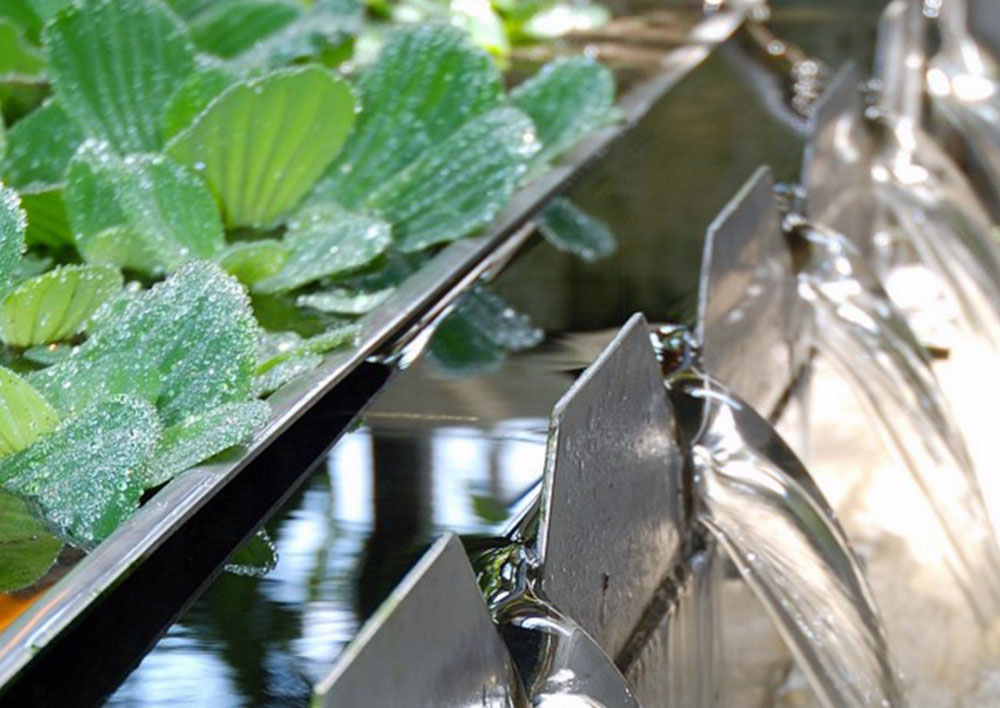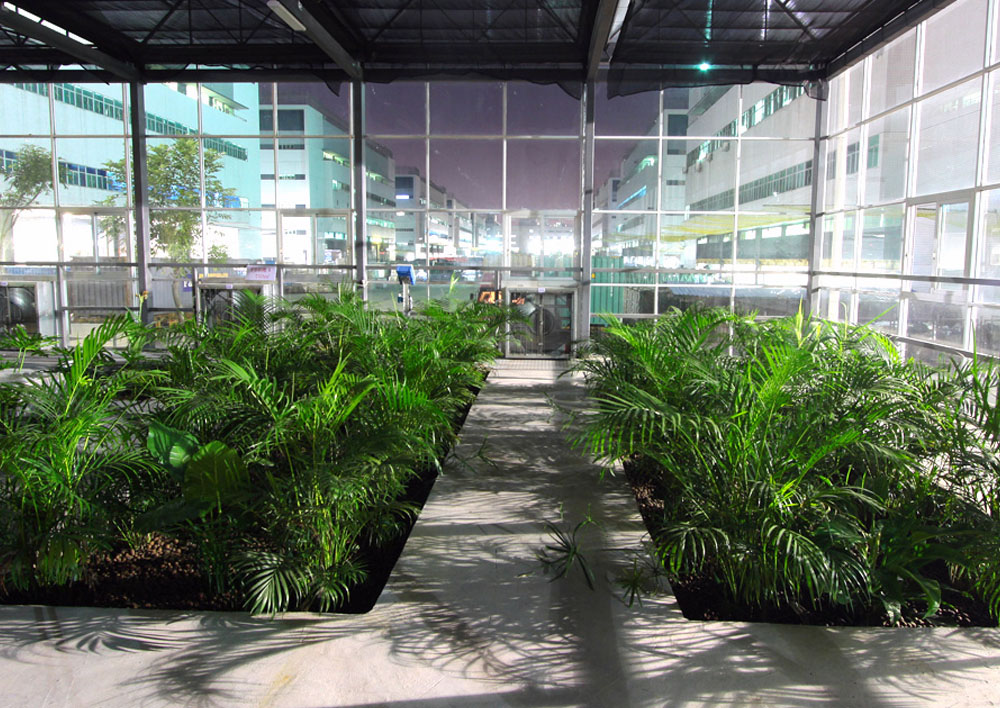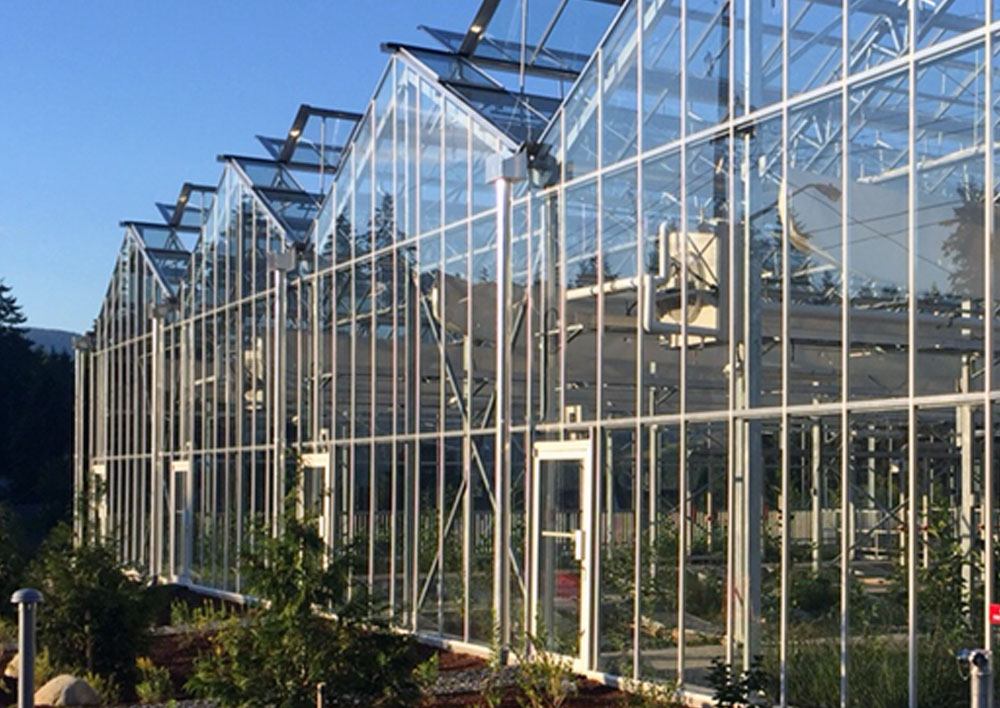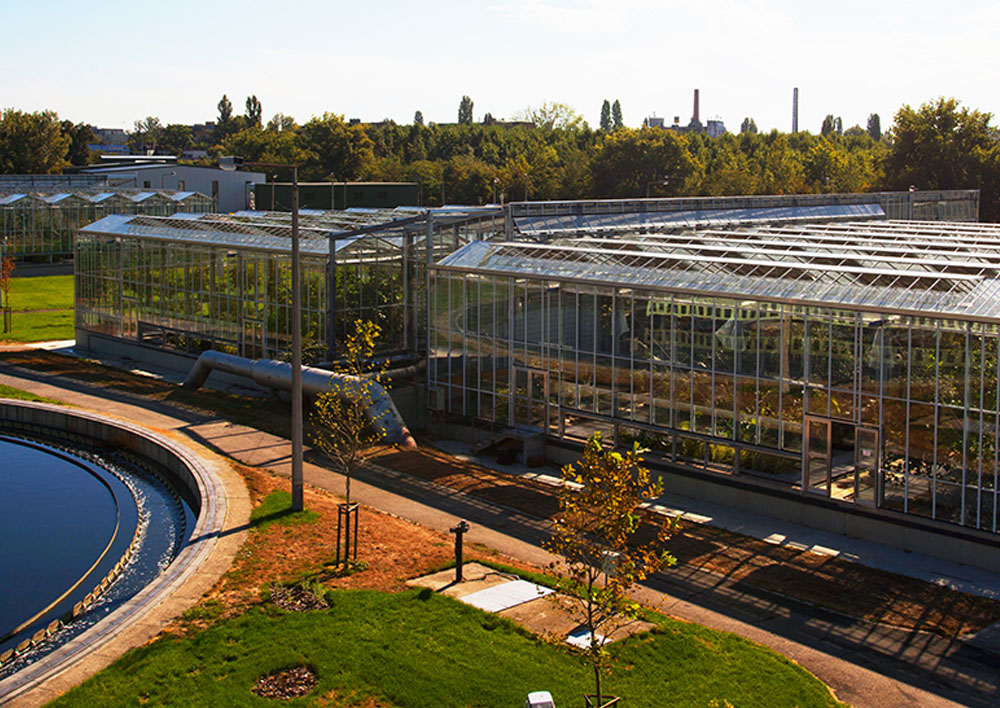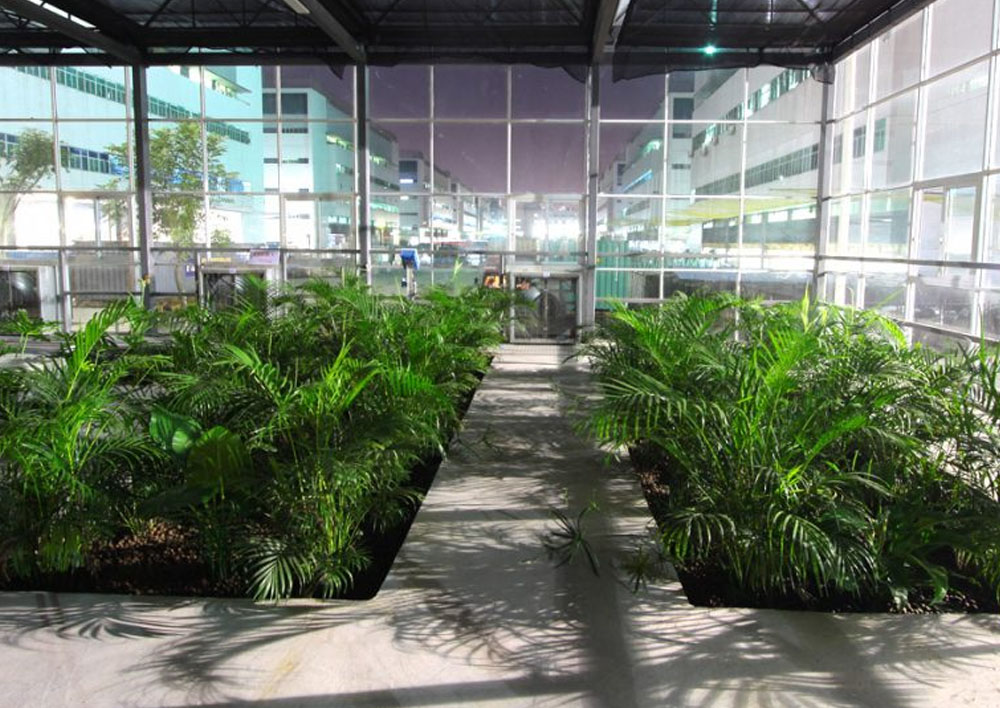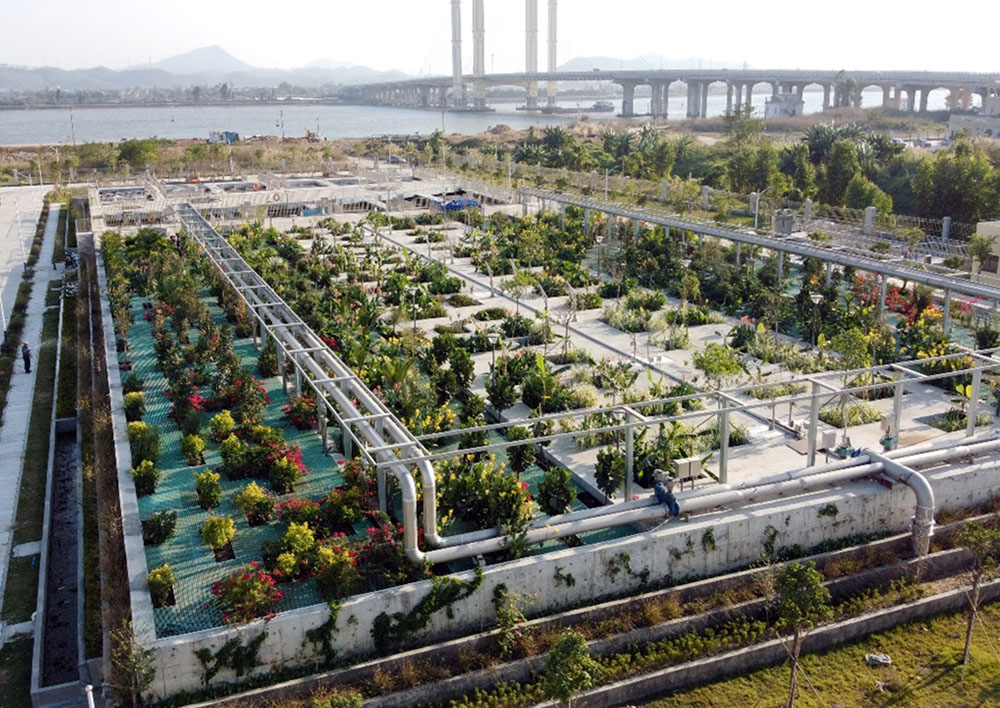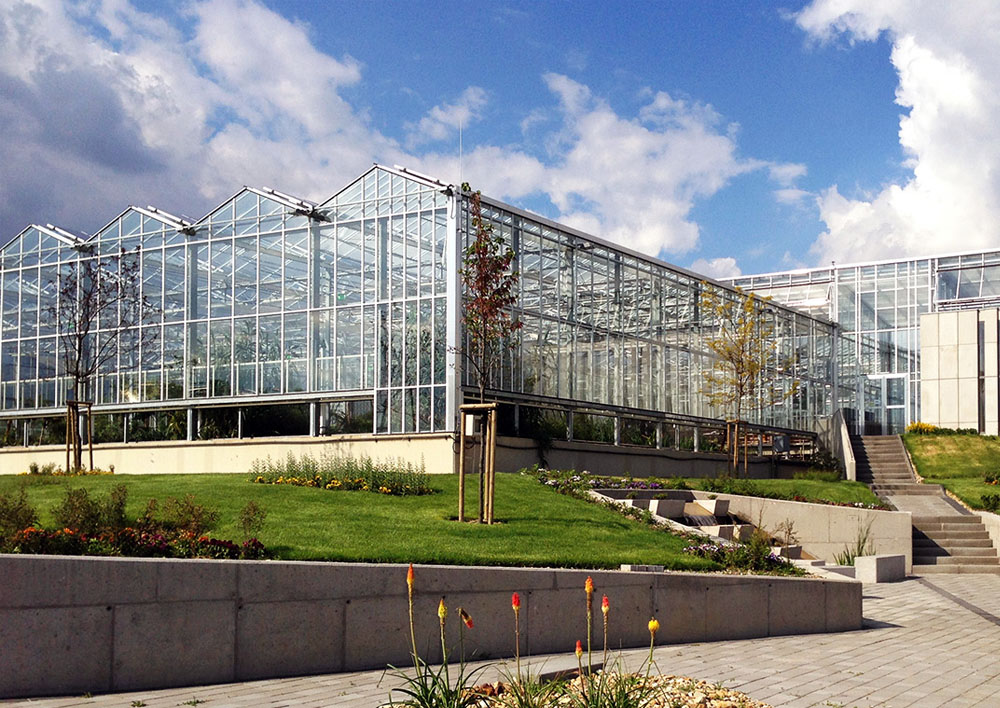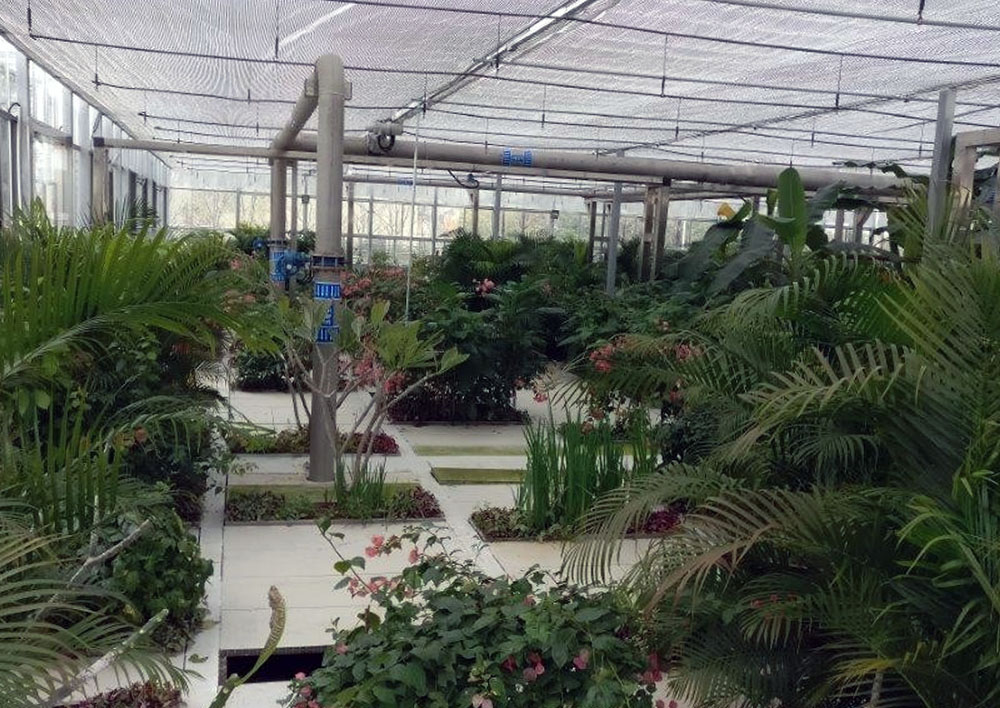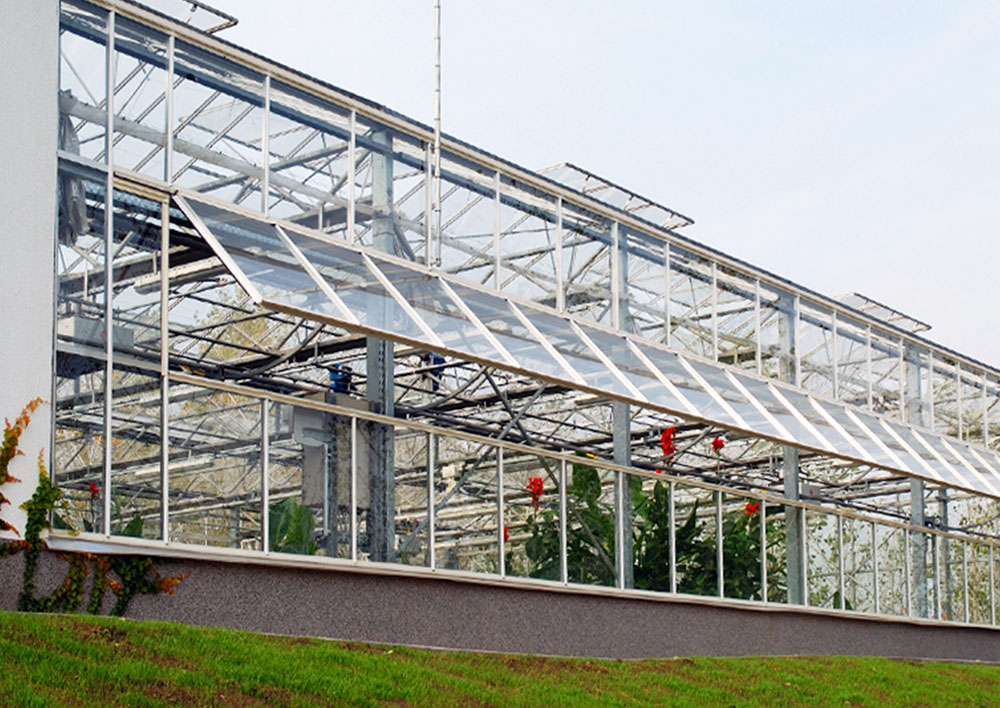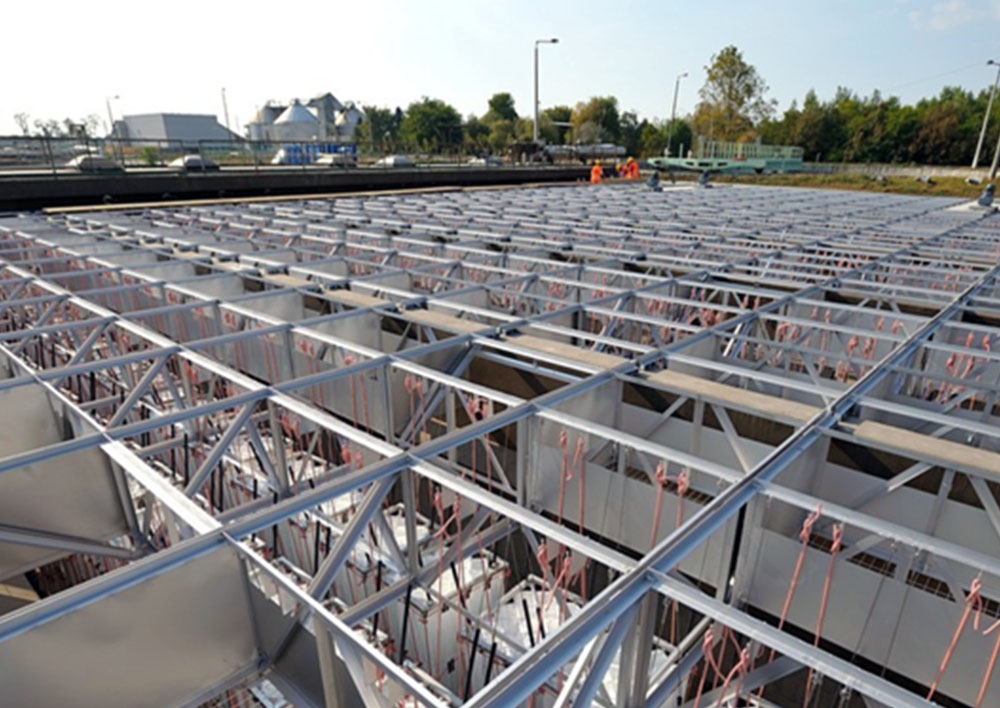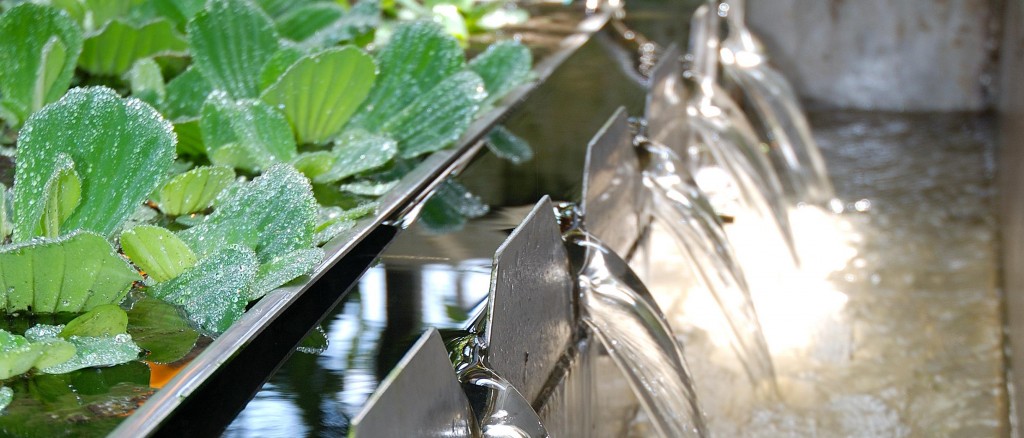
Organica Wastewater Treatment
A Unique and Sustainable Wastewater Treatment System
The Organica Wastewater Treatment Plant is a next-generation solution designed to deliver high-performance biological treatment with a strong emphasis on sustainability, aesthetics, and operational efficiency. By seamlessly combining natural ecosystems with advanced engineered processes, Organica enhances treatment performance while significantly reducing energy usage and environmental impact.
Ideal for urban, commercial, and decentralised applications, Organica offers a compact, odour-free, and visually appealing alternative to conventional wastewater treatment plants. Its advanced technology and proven reliability support cleaner discharge, water reuse, and long-term ecological balance.
With over 120 projects globally, Organica systems are successfully operating across all climates and geographies. Treatment capacities range from 1,000 to 200,000 m³/day, making this solution well-suited for towns, resorts, eco-developments, and infrastructure-constrained communities.
Hydroflux Epco is the exclusive delivery partner for Organica across New Zealand, Australia and the Pacific, bringing deep local knowledge, engineering capability, and end-to-end project expertise.
How the Organica Food Chain Reactor (FCR) Works
At the core of the Organica system is the Food Chain Reactor (FCR), an advanced biological treatment process based on the Fixed-Bed Biofilm Activated Sludge (FBAS) model.
FBAS is a form of Integrated Fixed-Film Activated Sludge (IFAS) technology. It uses both natural and engineered fixed media to provide a stable environment for diverse microbial communities that break down wastewater contaminants. Unlike conventional activated sludge or MBBR systems, where microbes float freely, Organica retains biomass on biofiber media and natural plant roots, supporting more efficient and resilient biological activity.
Key advantages of the Organica FCR:
- 90% reduction in Total Suspended Solids (TSS)
- Significantly reduced energy consumption and operational footprint
- High levels of nutrient removal and reuse-quality effluent
- Compact, enclosed form factor without large sedimentation tanks
- Visually integrated and odour-free for sensitive locations
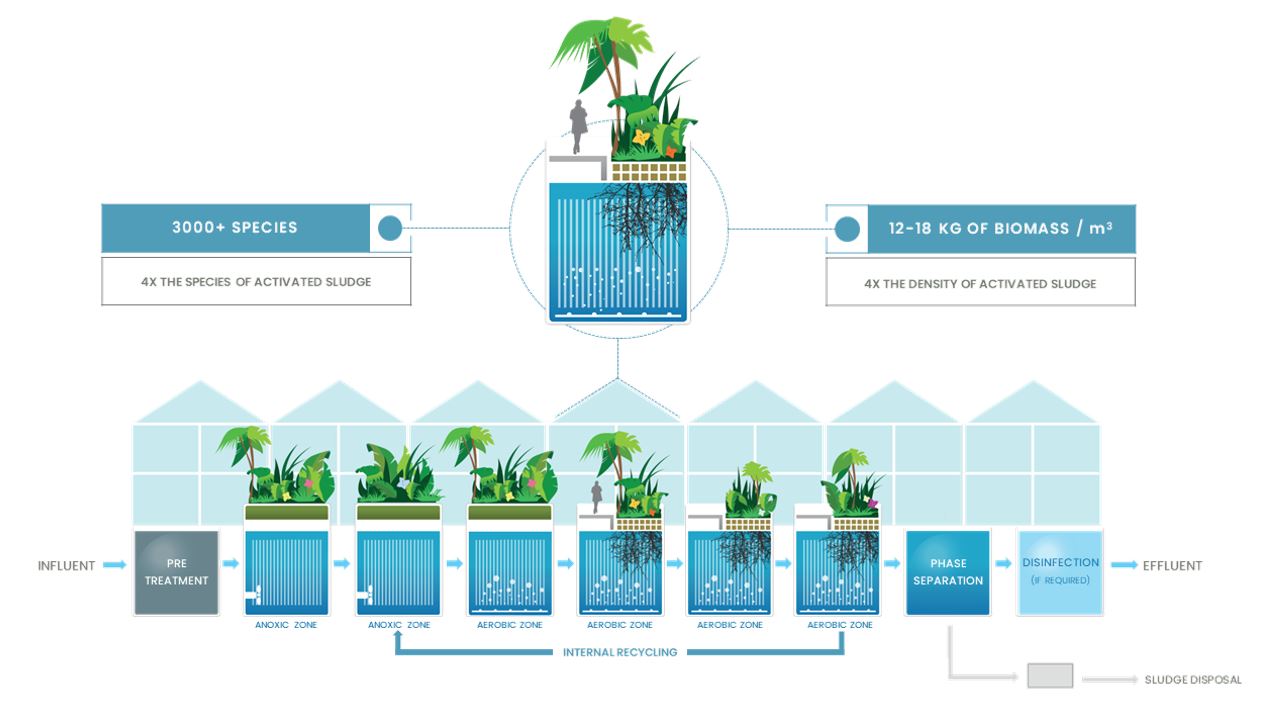
Wastewater flows through a series of cascade reactors, each containing dense fixed-media zones that support biofilm formation. These reactors operate in a staged configuration, optimising contaminant breakdown while significantly lowering overall infrastructure needs.
Organica has nearly two decades of expertise in developing fixed-film treatment systems, and the FCR is considered a best-in-class solution for communities seeking efficient, sustainable wastewater infrastructure.
The diagrams below illustrate the configuration of the engineered media and plant root systems within the FCR.
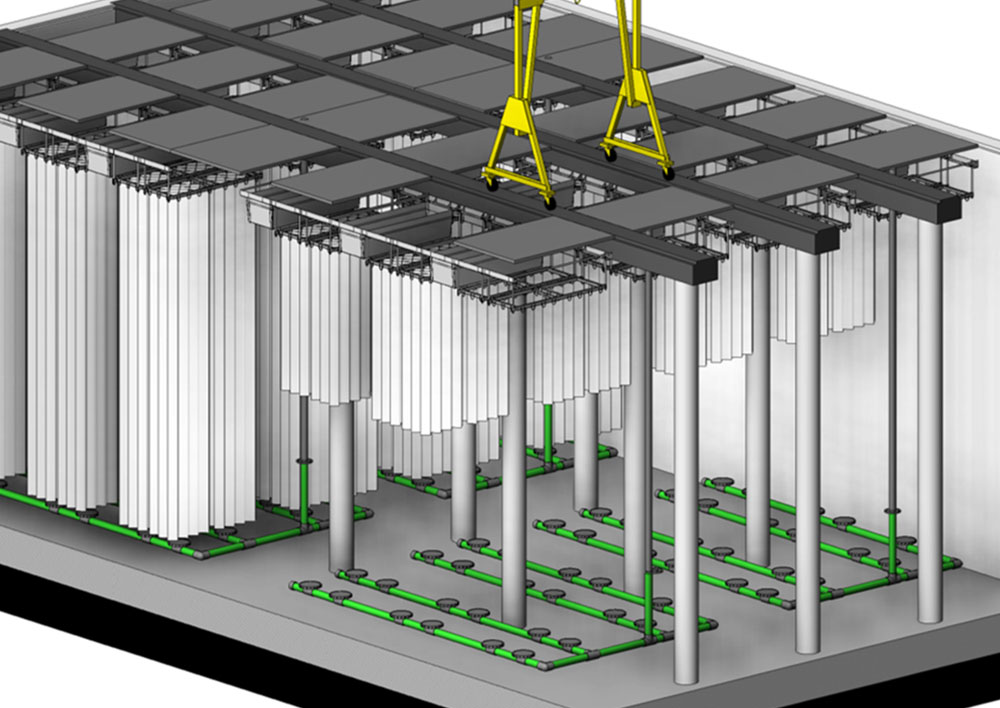
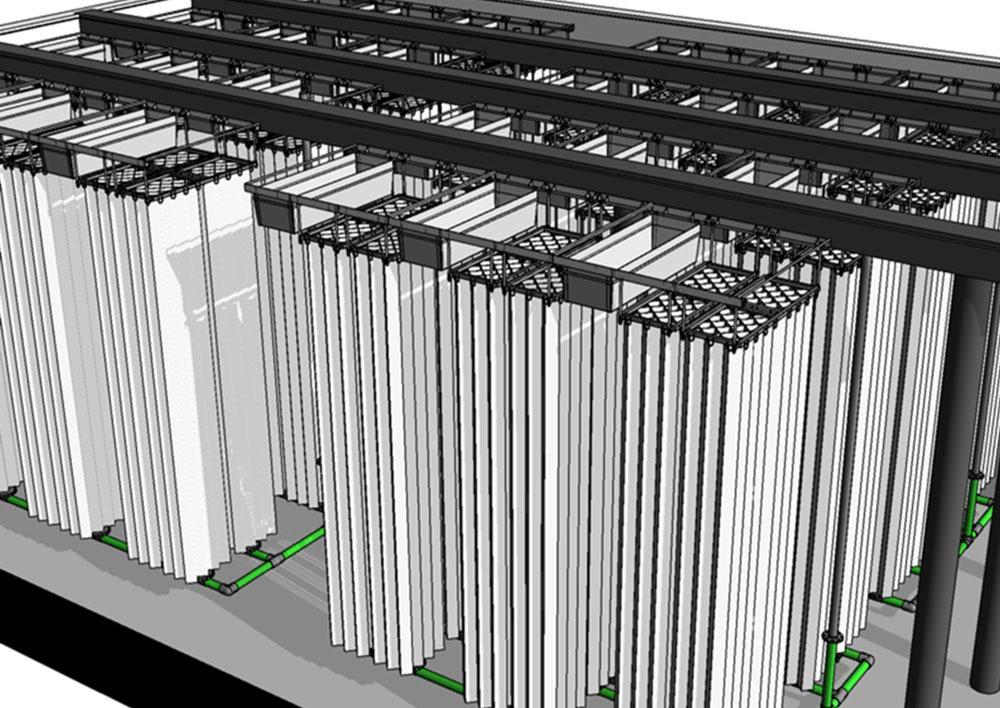
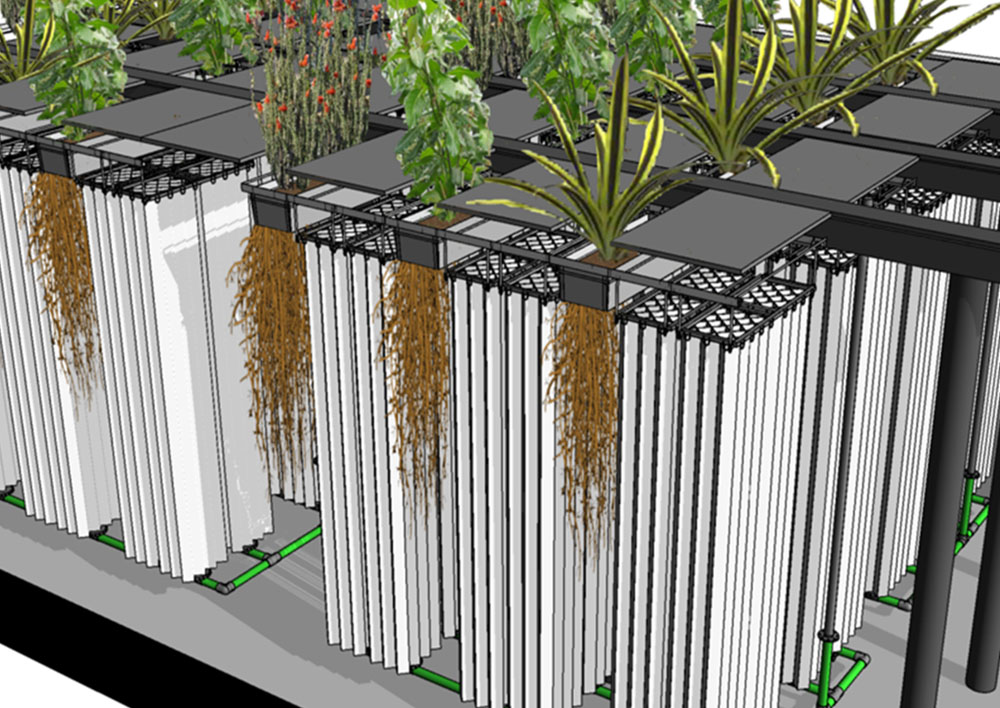
A Greener, Smarter Approach for Growing Communities
As cities expand and land becomes increasingly valuable, traditional wastewater infrastructure struggles to keep pace. In many parts of the world, urban density is rising, while elsewhere, urban sprawl is blurring the boundaries between city and suburb. In both scenarios, governments and utilities can no longer afford to dedicate large tracts of land to unattractive, remote wastewater plants.
Transporting wastewater and effluent to and from distant locations drives up infrastructure costs, and the odours and visibility of traditional plants often lead to community resistance.
Organica offers a different approach with its greenhouse-style architecture, garden-like appearance, and lack of typical treatment plant odour. An Organica FCR can be located much closer to the point of generation, dramatically reducing both geographic and “psychological” footprint.
This decentralised model allows for:
- Reduced capital expenditure on pipes and pumping
- Greater flexibility in urban planning
- Enhanced community integration
- Faster project approvals in sensitive environments
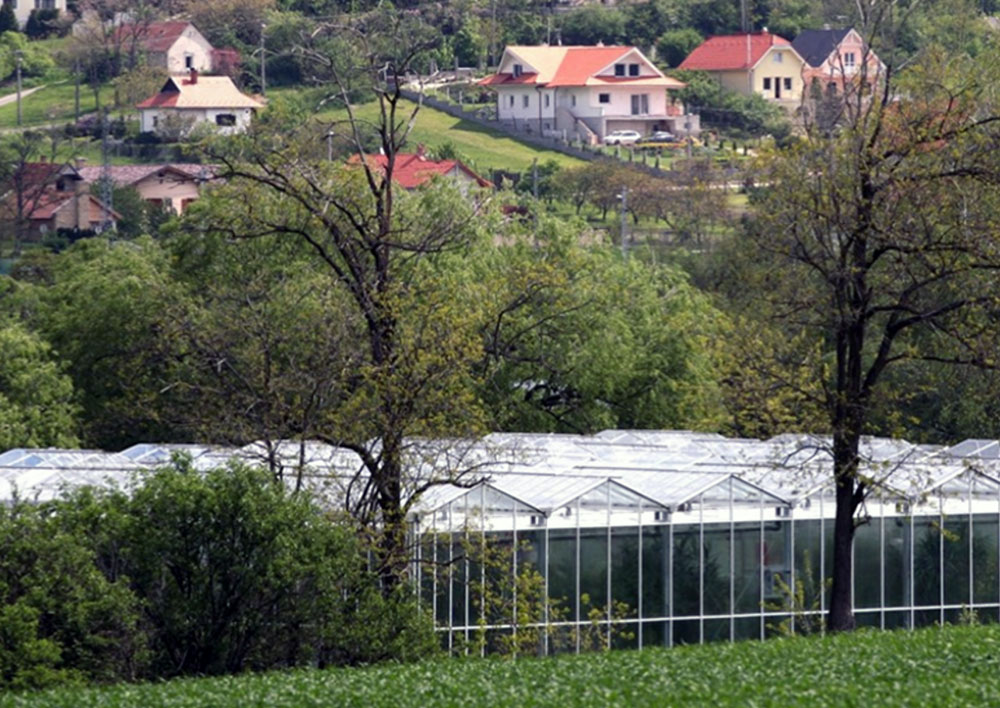
For growing cities, tourism regions, and high-density developments, Organica represents a new era of infrastructure that serves and complements its community.
Hydroflux Epco & Organica – A Perfect Partnership for Sustainable Wastewater Solutions
Hydroflux Epco is a leading force in wastewater treatment across New Zealand, Australia, and the Pacific Islands, with a long-standing track record of delivering turnkey water infrastructure projects. Our deep understanding of local regulatory environments, engineering standards, and sustainability objectives makes us the ideal delivery partner for Organica Systems.
We provide complete end-to-end services, from concept to commissioning and beyond, ensuring every Organica plant is tailored, compliant, and high-performing.
Organica’s Contributions to a project:
Core Process & System Design – Provides the biological treatment concept and process configuration.
Proprietary Technology Supply – Includes engineered media and reactor components.
Hydroflux Epco’s Contributions to a Project:
Project Management & Delivery – Manages the full project lifecycle from consultation to commissioning.
Design & Engineering – Adapts the Organica system to local site conditions, regulatory requirements, and effluent targets.
Local Equipment Supply – Provides supplementary systems, including inlet works, screening, pumping, and sludge management.
Installation & Commissioning – Oversees construction, integration, and operational handover.
Long-Term Support – Offers servicing, remote monitoring, training, and performance optimisation.
Regulatory Compliance – Ensures conformance with all environmental and discharge standards.
Hydroflux Epco can also supply a comprehensive range of additional equipment to enhance the overall efficiency and functionality of the wastewater treatment plant. This includes inlet works, screening systems and sludge management equipment. By integrating these components, Hydroflux Epco ensures a seamless, fully optimised treatment process, improving reliability, reducing maintenance, and enhancing overall plant performance.
Exploring the Right Wastewater Solution with Hydroflux Epco
Every site and project is different. That’s why Hydroflux Epco takes a consultative approach from the outset. In your initial engagement, our team will assess the suitability of Organica’s technology by reviewing:
- Site conditions and constraints
- Required treatment capacity and effluent quality
- Regulatory and planning requirements
- Sustainability and reuse goals
- Lifecycle cost considerations
If Organica is deemed a good fit, we’ll provide a tailored proposal and project roadmap, ensuring a smooth path from feasibility through to final commissioning and ongoing operation.
Contact Hydroflux Epco today to discover how Organica can be part of your next sustainable infrastructure project—or to explore the full range of solutions we offer across water and wastewater treatment.
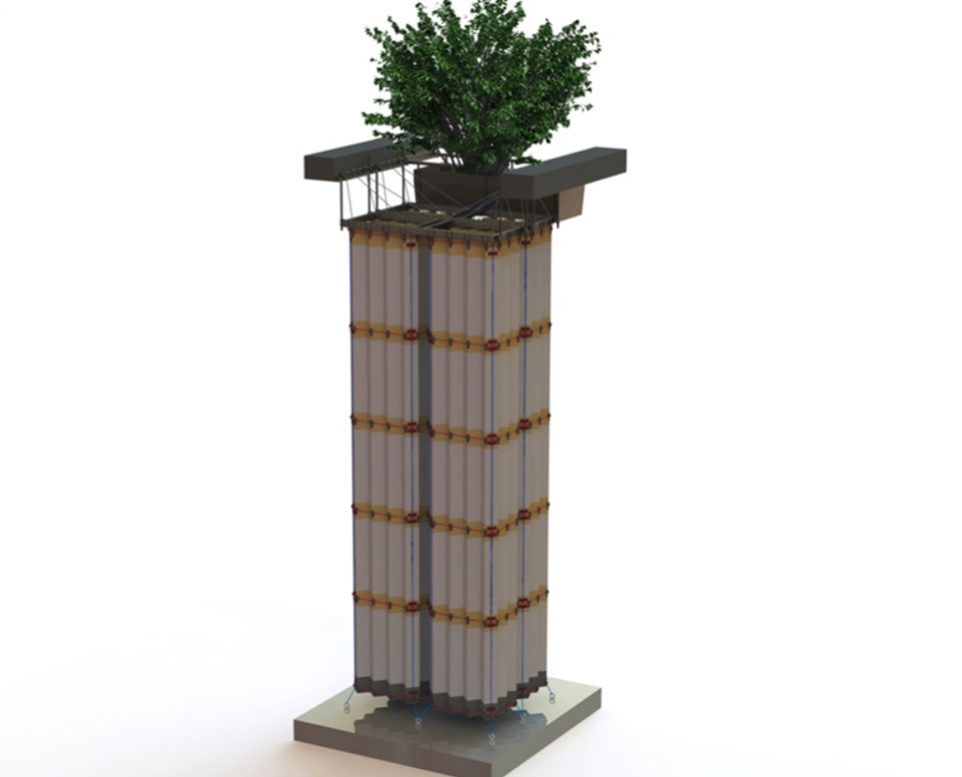
Organica FAQs
Organica Water has implemented over 120 wastewater treatment facilities across 18 countries on four continents, integrating its innovative approach into diverse environments. In Asia, notable installations include China’s Wusong facility in Shanghai, which transformed a traditional plant into a botanical garden-like treatment system, and India’s Bhatpara plant, which plays a key role in the Ganga River rejuvenation program by treating wastewater for over 52,000 households. Other key projects include the Surya Cipta industrial park facility in Indonesia, the Laguna Technopark plant in the Philippines, and multiple municipal and industrial installations across the region.
In Europe, Organica’s presence is strong in Hungary, where facilities in Budapest, Telki, and Etyek provide sustainable wastewater treatment solutions. France’s Gençay facility demonstrates how Organica’s technology can be integrated into historic settings, preserving the architectural and cultural integrity of the area. In North America, the Sechelt facility in British Columbia exemplifies urban-friendly wastewater treatment, blending seamlessly into the city’s landscape. Meanwhile, in Africa, the Verulam plant near Durban, South Africa, showcases how Organica’s modular approach can be used for decentralised water recovery. These projects highlight Organica’s adaptability in addressing wastewater challenges across different regions while promoting sustainability, space efficiency, and cost-effectiveness.
Hydroflux Epco has been awarded the contract to design and construct Australia’s first Organica Water Recycling Plant (WRP) at Aquarevo, a groundbreaking residential development in Lyndhurst, Victoria, Australia. A joint initiative by South East Water and Villawood Properties, Aquarevo is designed to be one of Australia’s most water and energy-efficient urban communities. By integrating advanced water management technologies, the development aims to reduce potable water consumption by up to 70% per household.
The system will treat approximately 52 million litres of wastewater annually. The resulting Class A recycled water will be used for non-potable applications, including toilet flushing, garden irrigation, and washing machines. The plant is expected to be operational late 2026.

